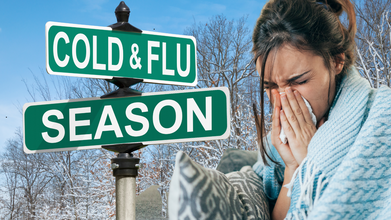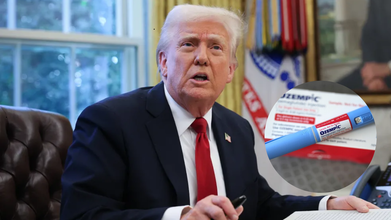- Health Conditions A-Z
- Health & Wellness
- Nutrition
- Fitness
- Health News
- Ayurveda
- Videos
- Medicine A-Z
- Parenting
- Web Stories
Five Every Day Drugs That Could Negatively Impact Your Heart, According To Doctor

Credits: Canva
Every medicine has its own set of side effects, and Dr Dmitry Yaranov, a Russia-based cardiologist, who specializes in heart failure, advanced heart failure, heart transplantation, and mechanical circulatory support, says that some everyday drugs can pose hidden risks to the heart. His message is not meant to spark fear but to encourage awareness about medications we often assume are completely harmless.
Below are five categories of common drugs that Dr. Yaranov believes deserve more caution, especially for those with existing heart issues.
NSAIDs - Nonsteroidal Anti-inflammatory Drugs
These are your everyday painkillers, which includes ibuprofen or naproxen. While they are go-to options for headaches, fever, or muscle cramps, Dr Yaranov says that its frequent use could strain the heart.
These drugs reduce inflammation by blocking certain chemical pathways, but they also make the body retain salt and water. This can:
- Raise blood pressure
- Worsen swelling
- Increase the risk of heart failure, particularly in people who already have high blood pressure or heart disease
Dr. Yaranov suggests discussing long-term or frequent NSAID use with a doctor, instead of using them casually.
Chemotherapy Drugs
While these drugs are life-saving, it may have side effects that could weaken the heart muscles. Dr Yaranov explains that drugs like doxorubicin or trastuzumab could also affect how well the heart pumps blood, which can lead to ardiomyopathy or heart failure.
Because of this, many cancer centres now include routine heart monitoring before, during, and after chemotherapy. The goal is to fight cancer without compromising long-term heart health.
Stimulant Medicines For ADHD
Stimulants that contain amphetamines help improve focus and alertness, but Dr. Yaranov warns that they can also:
- Increase heart rate
- Raise blood pressure
- Trigger arrhythmias
Elevate the risk of heart attack in people who have underlying heart issues
He stresses that misuse or unsupervised use is especially dangerous. Even for those who take them as prescribed, regular follow-ups with a doctor are important.
Older Diabetes Medications
Managing diabetes could mean being on medicines for lifelong. Yaranov points out that older drugs like rosiglitazone can increase the risk of heart failure despite effectively lowering blood sugar. Because of these concerns, many doctors now prefer newer diabetes medications that also support cardiovascular health. However, patients should never switch or stop medicines without medical guidance.
Common Cold Medicines
Thanks to allergens and climate change, common cold now stays all around the year, which means you will be taking cold medicines frequently and for a longer stretch. These medicines contain pseudoephedrine that work by narrowing blood vessels to relieve nasal congestion, however, Dr Yaranov says that they can also:
- spike blood pressure
- Disturb normal heart rhythms
- Increase strain on the heart
For individuals with hypertension or heart disease, Dr. Yaranov advises avoiding these drugs or using them only after consulting a healthcare provider.
Dr. Yaranov’s core message is simple: even routine medications have side effects worth understanding. Being informed helps people protect their cardiovascular health, especially if they already have heart risk factors. The goal is not to avoid necessary treatment but to use medicines wisely and stay in regular touch with your doctor.
Note: This article is based purely on the remarks shared by Dr. Dmitry Yaranov. Health and Me does not recommend discontinuing or changing any medication without first consulting your doctor.
NHS Issues Flu Jab SOS; Is UK To See The Worst Flu Season?

Credits: Canva
NHS has now issued a "flu jab SOS" as fears grow that the flu cases will add up to a brutal winter. While it is every winter that the flu strikes, this year, there is something different. A seasonal flu usually mutates in the summer and thus evade some of our immunity, which may have kicked in early flu season before. A seasonal flu is thus a type that has a history of being more severe.
All thanks to flu staying all round the year, flu experts have now said that they won't be shocked if this flu season becomes the worst flu season for a decade.
Professor Nicola Lewis, the director of the World Influenza Center at the Francis Crick Institute told BBC, "We haven't seen a virus like this for a while, these dynamics are unusual. It does concern me, absolutely. I'm not panicking, but I am worried."
What Is Happening To Flu Season This Year?
Scientists have been able to track the evolution of influenza viruses because they mutate constantly, and thus the flu vaccines have to be updated every year to keep up. The evolution happens in a rhythm which is known as the "shift and drift". Most of the time the virus undergoes a minor change, however, every often there is also a sudden attempt for an abrupt shift as the virus keeps mutating.
Prof Derek Smith, who heads the Centre for Pathogen Evolution at the University of Cambridge, says seven mutations in a strain of the H3N2 seasonal flu have caused a rapid rise in cases involving this altered version of the virus.
Unusually, this spike happened outside the typical flu season, right in the middle of the northern hemisphere’s summer. “It will almost certainly spread worldwide, and quickly,” says Prof Smith. By September, once schools reopened and temperatures began to fall, cases started rising again.
Experts are still studying the exact impact of the mutations, but they likely help the virus slip past some of the immunity people have developed from past infections and vaccines. This makes it easier for the virus to infect and spread, which is why flu season has arrived early in the UK and countries like Japan.
If the virus spreads more easily, it doesn’t need to wait for cold winter conditions, when people stay indoors with closed windows, to trigger flu season. “We’re already far ahead,” says Prof Lewis. “This is likely to be a strong flu season.”
Using R numbers as a guide, the new mutated strain appears to have an advantage. Seasonal flu normally has an R value of about 1.2, but this year’s early estimates put it closer to 1.4. That means if 100 people were infected, they would typically spread it to 120 others, but this year that number could be around 140.
Could This Be The Worst Flu Season?
Professor Christophe Fraser, from the Pandemic Sciences Institute at the University of Oxford told BBC, "It's highly likely it's going to be a bad flu season and it's going to happen quite soon, we're already well into it. There are indicators that this could be worse than some of the flu seasons we've seen in the last 10 years."
In a normal flu season, about one in five people get infected, but that number could be higher this year, he warns. Still, there’s a lot of uncertainty around these predictions.
Many look to Australia for hints, since it saw its worst flu season on record, although it was dealing with a different H3N2 strain than the one spreading now.
Right now, the virus is circulating rapidly among children, especially in schools where germs spread easily. But the immunity of a 10-year-old is very different from that of an older adult, who has lived through many more flu seasons and carries different immune memory.
Because of this, experts will be watching closely as infections begin to move into older age groups in the coming weeks.
TrumpRx Deal For Lowering Popular Weight Loss Drugs Is Not Flawless, People May End Up Paying More, Say Experts

Credits: AP
"Did I do a good job? Do you think Biden could have done this? I don't think so," said President Donald Trump to the reporters assembled at the Oval Office after he made the announcement that he had secured a deal to slash the price of obesity drugs. His website, TrumpRx, will offer the sale of drugs like Wegovy and Zepbound, for only around $250 a month, which is a fraction of their current retail price which is more than $1,000.
While it is a breakthrough, as many private insurances do not cover obesity drugs, and often forces people to pay for these injections out of pocket, experts point out that this system is not entirely flawless.
TrumpRx Is Not Flawless
Drug policy experts say that while the administration has promised drugs at a cheaper rate, some of these discounts have not been approved yet by the Food and Drug Administration. The problem is that the lower prices for people paying out of pocket would only apply to the lowest doses of the drugs, however, the deal does not expand Medicare coverage to people seeking treatment for weight loss alone.
Juliette Cubanski, who is the deputy director of Medicare policy program at KFF, said, and as is reported in NBC News, "It’s a situation where we have more questions than answers. Based on what we didn’t hear, that suggests to me that there’s a lot that the administration itself hasn’t even ironed out as of yet. It just feels a little bit too squishy right now."
Art Caplan, also reported in NBC News, who is the head of the division of medical ethics at NYU Grossman School of Medicine in New York City, said, "It’s just murky as to how this will take shape, how the programs will work. You can’t really tell from what’s going on.”
Are There Unapproved Drugs On The List?
Several drugs and forms of drugs included in the deal are actually not approved by the FDA. These include oral versions of weight loss drugs, and Eli Lilly's new multidose injection pens. In fact, Lawrence Gostin, director of the O'Neill Institute for National and Global Health Law at Georgetown University said that the administration has made premature promises because the lower prices cannot take effect until the products are on the market. "It is reckless to negotiate pricing deals on products which the FDA have not yet approved as safe and effective. The administration is getting way out ahead of its own safety agency.”
The list includes:
- Oral weight loss pills by Wegovy
- Oral weight loss pills by Novo Nordisk
- Multidose version of Zepbound
Prices Are Low, But People May End Up Paying More
While the White House did say that both the pills and injection pens will be available for discounted prices for those who pay out of pocket, policy makers say that they may end up paying more.
The starting doses of weight loss pill will cost $149 per month, and the shots will cost around $350 for a month's supply. The price of the injection is further expected to fall to about $259 within two years. However, when people start with the drugs, they start with the lowest dose that allows the body to get used to the drug, However, over the course of time, the dose increases to be effective for weight loss. For Wegovy, the highest doses are five, for Zepbound, it is six, and the most weight loss has seen with the highest doses.
Officials said the starting dose of GLP-1 pills will cost $149 per month, though they didn’t clarify pricing for higher doses.
For injections, the White House offered only a “weighted average” estimate of $350 a month. Lilly later specified that Zepbound will start at $299 for the lowest dose, rising to $449 for higher ones. Novo Nordisk didn’t confirm dose-based pricing and said it will share updated cost details in the coming weeks.
All of this means patients using TrumpRx could ultimately pay significantly more than the administration’s headline prices, especially since most people don’t remain on the lowest dose for long, Caplan noted.
Davina McCall Reveals Breast Cancer Surgery A Year After Her Brain Tumor Surgery

Credits: Wikimedia Commons
TV presenter Davina McCall revealed that she had breast cancer, almost a year after she had undergone a surgery to remove her brain tumor. In a video that she posted on her Instagram, she revealed that she was "very angry" when she found out the news, however, she is in a "much more positive place" after she has undergone another surgery three weeks ago to remove the tumor from her breast.
How Did She Realize She Had Breast Cancer?
She said that she found a lump a few weeks ago, however, it came and went back, so she continued to do her work. "I found a lump a few weeks ago. It came and went but then I was working on The Masked Singer and Lorraine, the TV show, and Lorraine Kelly had put signs on the backs of all the doors saying 'check your breasts' and every time I went for a wee, I did that," she said.
She continued: "It was still there, and then one morning I saw myself in the mirror and thought 'I'm going to get that looked at'. I had a biopsy. I found out it was indeed breast cancer and I had it taken out in a lumpectomy nearly three weeks ago."
McCall, who is now 58, says that the lump was "very, very small" and was discovered at an early stage. "I am so relieved to have had it removed and to know that it hasn't spread. My lymph nodes were clear, I didn't have any removed, and all I'm going to do now is have five days of radiotherapy in January as kind of an insurance policy," she said.
"It's been a lot. I was very angry when I found out, but I let go of that, and I feel in a much more positive place now. "I think my message is: get checked if you're worried. Check yourself regularly. If you are due a mammogram, then get it done," she said.
Dense Breast And Mammogram
She also revealed that it was only in August that she got her mammogram done, however, she has dense breasts, and so nothing was detected. "I have dense breasts and I had a mammogram in August, and I was postponing the ultrasound; I just couldn't find time to do it. Don't do that. Get the ultrasound."
Difference Between Breast Ultrasound And A Mammogram
Breast Ultrasound: A breast ultrasound uses sound waves that reflect off the breast tissue to create detailed images of the breast. There is no radiation involved.
Mammogram: A mammogram is an X-ray of the breast. A mammogram is an X-ray of the breast. A diagnostic mammogram focuses more closely on the area(s) of concern. We will get more X-ray views of the concerning area. We perform a diagnostic mammogram any time a patient comes in with symptoms of breast cancer or after an abnormal screening mammogram.
As per the MD Anderson Cancer Center, normal breast tissue and cancerous tissue, both appear white on a mammogram, this is when an ultrasound can help us see small cancers that may be hiding amongst normal breast tissue. This is especially true for women with dense breasts, which means they have more glandular tissue and less fat in their breasts.
However, the MD Anderson Cancer Center mentions that ultrasound is not recommended as a replacement for a mammogram. "Screening mammograms detect about 4 to 6 cases of breast cancer per 1,000 women. When a breast ultrasound is done on top of that, we detect about 2 to 3 more cases. So, breast ultrasound is a valuable screening tool we use in addition to a mammogram," it notes.
© 2024 Bennett, Coleman & Company Limited

